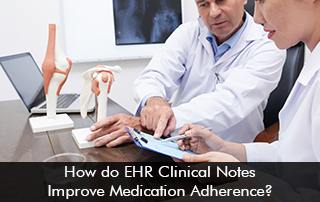When it comes to people suffering from chronic diseases or illnesses, medication non-adherence is a major issue. Medication non-adherence occurs when a patient does not take their prescriptions as recommended for any reason, which can have a detrimental impact on patient outcome levels. Medication adherence is affected by factors such as cost, anxiety, and misunderstandings.
Medication non-adherence Rate
The World Health Organization (WHO) revealed that the medication nonadherence rate is 50% in patients suffering from chronic diseases. Healthcare providers and stakeholders in the healthcare sector are trying out different strategies to enhance adherence and surprisingly a new study provides valuable insights related to EHR clinical notes and improved medication adherence.
Patient Access to EHR Clinical Notes Leads to Improved Adherence
The Journal of the American Geriatrics Society published a study that discovered that the accessibility of EHR clinical notes can lead to older patients with chronic diseases being more engaged and adherent to medication dosages.
Researchers surveyed patients using the Patient Portal EMR Software solution from three healthcare organizations in the US. The surveyed users were above 65 years old and had a minimum of a single clinical note from the past year. The research also fights the notion of older patients not using online digital tools such as the patient portal platform.
It was learned that patients with chronic conditions who read clinical notes helped them stay engaged in their healthcare journey. They also revealed that by having easy access to notes they could remember their care plan supporting them to take their medications on time. Older patients are prone to forgetting care plans but clinical notes help them stay on track of their medication adherence and answer any confusions they have regarding their prescription.
How providers can use EHR clinical notes to identify barriers to adherence?
Medical professionals can detect potential obstacles to drug adherence with the aid of EHR clinical notes, such as forgetfulness, expense, side effects, or trouble remembering to take medications on time. By recognizing such barriers, physicians can collaborate with patients to come up with solutions that will increase adherence.
EMR clinical notes can help healthcare practitioners and patients communicate about medication adherence. For example, if a patient is not following their prescription regimen, the physician can utilize the EHR clinical notes to have a conversation with the patient about why they are struggling to adhere. Therefore they can collaborate to establish a plan to increase adherence and hence boost patient outcome levels.
Importance of Patient Engagement to Enhance Medication Adherence
Medical organizations should make patient information easily accessible. Clinical records can be supplemented with simple jargon to aid improve patient comprehension, increase medication adherence, and improve patient outcomes.
To ensure that patients are engaged with chronic care plans after their session with the healthcare provider practices should implement a user-friendly patient portal platform.
For higher adaptation rates the patient portal online tool should be intuitive so patients are less hesitant to use it for their benefit. When patients are allowed to view their EHR data online it leads to higher satisfaction scores, boosting patient engagement and increasing overall medication adherence. The patient information in personal files keeps patients well informed to take their prescribed medications and feel involved throughout their healthcare journey.







